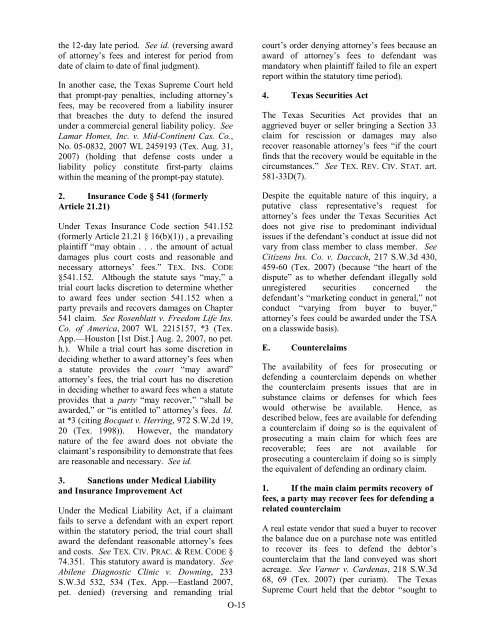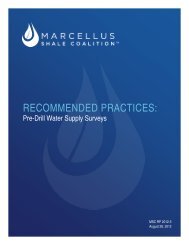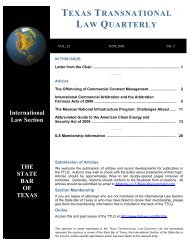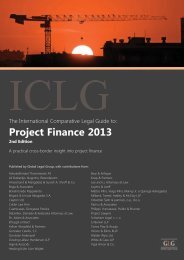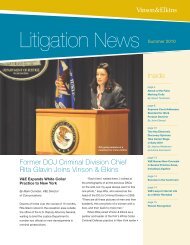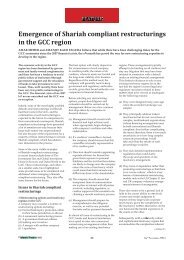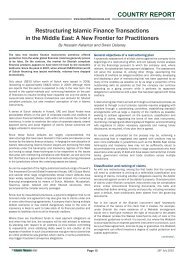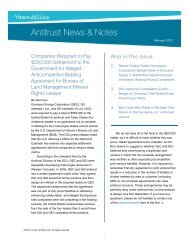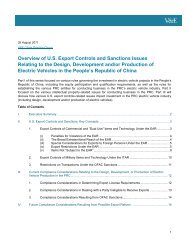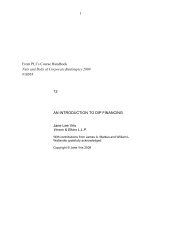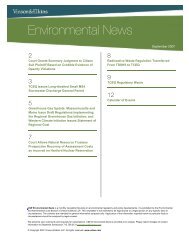Attorney's Fees Update - Vinson & Elkins LLP
Attorney's Fees Update - Vinson & Elkins LLP
Attorney's Fees Update - Vinson & Elkins LLP
You also want an ePaper? Increase the reach of your titles
YUMPU automatically turns print PDFs into web optimized ePapers that Google loves.
the 12-day late period. See id. (reversing award<br />
of attorney’s fees and interest for period from<br />
date of claim to date of final judgment).<br />
In another case, the Texas Supreme Court held<br />
that prompt-pay penalties, including attorney’s<br />
fees, may be recovered from a liability insurer<br />
that breaches the duty to defend the insured<br />
under a commercial general liability policy. See<br />
Lamar Homes, Inc. v. Mid-Continent Cas. Co.,<br />
No. 05-0832, 2007 WL 2459193 (Tex. Aug. 31,<br />
2007) (holding that defense costs under a<br />
liability policy constitute first-party claims<br />
within the meaning of the prompt-pay statute).<br />
2. Insurance Code § 541 (formerly<br />
Article 21.21)<br />
Under Texas Insurance Code section 541.152<br />
(formerly Article 21.21 § 16(b)(1)) , a prevailing<br />
plaintiff “may obtain . . . the amount of actual<br />
damages plus court costs and reasonable and<br />
necessary attorneys’ fees.” TEX. INS. CODE<br />
§541.152. Although the statute says “may,” a<br />
trial court lacks discretion to determine whether<br />
to award fees under section 541.152 when a<br />
party prevails and recovers damages on Chapter<br />
541 claim. See Rosenblatt v. Freedom Life Ins.<br />
Co. of America, 2007 WL 2215157, *3 (Tex.<br />
App.—Houston [1st Dist.] Aug. 2, 2007, no pet.<br />
h.). While a trial court has some discretion in<br />
deciding whether to award attorney’s fees when<br />
a statute provides the court “may award”<br />
attorney’s fees, the trial court has no discretion<br />
in deciding whether to award fees when a statute<br />
provides that a party “may recover,” “shall be<br />
awarded,” or “is entitled to” attorney’s fees. Id.<br />
at *3 (citing Bocquet v. Herring, 972 S.W.2d 19,<br />
20 (Tex. 1998)). However, the mandatory<br />
nature of the fee award does not obviate the<br />
claimant’s responsibility to demonstrate that fees<br />
are reasonable and necessary. See id.<br />
3. Sanctions under Medical Liability<br />
and Insurance Improvement Act<br />
Under the Medical Liability Act, if a claimant<br />
fails to serve a defendant with an expert report<br />
within the statutory period, the trial court shall<br />
award the defendant reasonable attorney’s fees<br />
and costs. See TEX. CIV. PRAC. & REM. CODE §<br />
74.351. This statutory award is mandatory. See<br />
Abilene Diagnostic Clinic v. Downing, 233<br />
S.W.3d 532, 534 (Tex. App.—Eastland 2007,<br />
pet. denied) (reversing and remanding trial<br />
O-15<br />
court’s order denying attorney’s fees because an<br />
award of attorney’s fees to defendant was<br />
mandatory when plaintiff failed to file an expert<br />
report within the statutory time period).<br />
4. Texas Securities Act<br />
The Texas Securities Act provides that an<br />
aggrieved buyer or seller bringing a Section 33<br />
claim for rescission or damages may also<br />
recover reasonable attorney’s fees “if the court<br />
finds that the recovery would be equitable in the<br />
circumstances.” See TEX. REV. CIV. STAT. art.<br />
581-33D(7).<br />
Despite the equitable nature of this inquiry, a<br />
putative class representative’s request for<br />
attorney’s fees under the Texas Securities Act<br />
does not give rise to predominant individual<br />
issues if the defendant’s conduct at issue did not<br />
vary from class member to class member. See<br />
Citizens Ins. Co. v. Daccach, 217 S.W.3d 430,<br />
459-60 (Tex. 2007) (because “the heart of the<br />
dispute” as to whether defendant illegally sold<br />
unregistered securities concerned the<br />
defendant’s “marketing conduct in general,” not<br />
conduct “varying from buyer to buyer,”<br />
attorney’s fees could be awarded under the TSA<br />
on a classwide basis).<br />
E. Counterclaims<br />
The availability of fees for prosecuting or<br />
defending a counterclaim depends on whether<br />
the counterclaim presents issues that are in<br />
substance claims or defenses for which fees<br />
would otherwise be available. Hence, as<br />
described below, fees are available for defending<br />
a counterclaim if doing so is the equivalent of<br />
prosecuting a main claim for which fees are<br />
recoverable; fees are not available for<br />
prosecuting a counterclaim if doing so is simply<br />
the equivalent of defending an ordinary claim.<br />
1. If the main claim permits recovery of<br />
fees, a party may recover fees for defending a<br />
related counterclaim<br />
A real estate vendor that sued a buyer to recover<br />
the balance due on a purchase note was entitled<br />
to recover its fees to defend the debtor’s<br />
counterclaim that the land conveyed was short<br />
acreage. See Varner v. Cardenas, 218 S.W.3d<br />
68, 69 (Tex. 2007) (per curiam). The Texas<br />
Supreme Court held that the debtor “sought to


